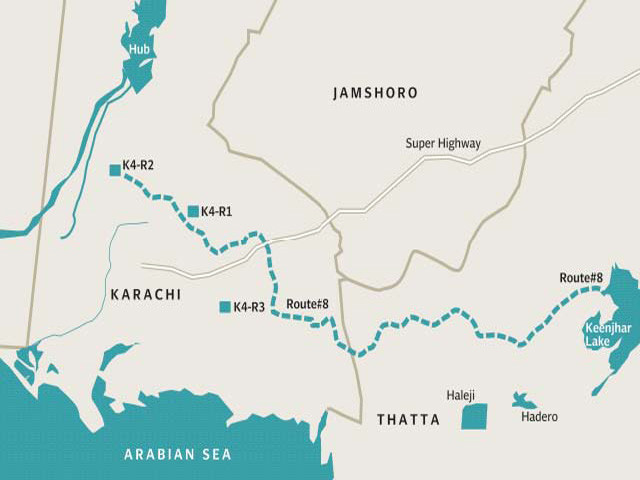Stagnant scheme deepening city’s water crisis
Karachi needs 1,200 cusecs of water to implement a much-needed project.

Stagnant scheme deepening city’s water crisis
The project, for which planning has been going on since 2007, has been delayed for the past three years. The water and sewerage department has been unable to forward the PC-1 or preliminary plan for the project to the planning and development department because the Sindh government has yet to fix an additional quota of 1,200 cusecs or 650 million gallons per day (MGD) of water from the River Indus for Karachi.
In 1980, the federal government had reserved 1,200 cusecs of water for Karachi, which were supplied to the city from Keenjhar Lake via Gharo. Since then, several schemes have been completed to provide for the increasing population of the city.
The last water scheme launched to match the increasing population was the K-III scheme in 2006. With its additional 100 MGD water, the use of water per person (per capita) came to around 42 gallons. At present, a minor water crisis is in the making and the rate has lowered to 35 gallons per person - the needs are the same if not more, but the supply has drastically shrunk.
In 2002, a joint committee comprising staff of the irrigation department, planning and development department and the Karachi Water and Sewerage Board (KWSB) was formed by the provincial government. The committee, keeping in view the needs of the rising population of Karachi, had forwarded a suggestion that an additional 1,200 cusecs water should be provided to Karachi till 2025.
Afterwards, in 2008, the Japan International Cooperation Agency (Jica) carried out a study in Karachi and revealed that there was a yearly 4.5 per cent increase in the city’s population. The organisation also recommended that the plan for a larger water supply to Karachi should be implemented immediately.
The provincial government had requested the Indus River System Authority (Irsa) to fix a water quota of 1,200 cusecs for Karachi but Irsa rejected the request and suggested that the provincial government supply the required water to Karachi out of its quota. The Sindh government did not protest then but neither did it figure out how Karachi would get the required water. Its quota from the Indus River is 38.1 million acre feet.
According to sources, the project will only be implemented at a cost of Rs25 billion and that too in three phases, which will be completed by 2025 - provided all goes well. The first phase of the project will be to supply 260 MGD and it has to be completed in the next four years. The second phase is of 260 MGD and the third phase of 130 MGD. Around 10,000 acres of land will be reserved for the project, which will be constructed along an alternative route. The present route for the bulk supply of water to Karachi is through Gharo, which is located too close to the sea shore and can be affected by cyclones and storms. The system of the Greater Karachi Bulk Water Supply Scheme K-IV will be built at least 40 miles away from the current route so if one system is destroyed the other will remain safe.
If the project is not completed on time then the planning and development department’s vision 2020 will fail completely. Sources said that many development projects, including the Karachi Northern Bypass Housing Scheme, the new DHA Housing Scheme at the Super Highway, the MDA Scheme, Education City, new industrial schemes, Shah Latif Town, Hawkes Bay Scheme 42 and Scheme 33, might come to a halt if they do not get the required water.
Power outages and water shortage
According to the water board, a single hour of power outage can cause 12 hours delay in pumping water. As a result, load shedding can suspend water supply for several hours. The KESC, however, maintains that unless there is a techincal fault, they do not schedule load shedding at water pumping stations under the water board.
Published in The Express Tribune, November 8th, 2010.



















COMMENTS
Comments are moderated and generally will be posted if they are on-topic and not abusive.
For more information, please see our Comments FAQ